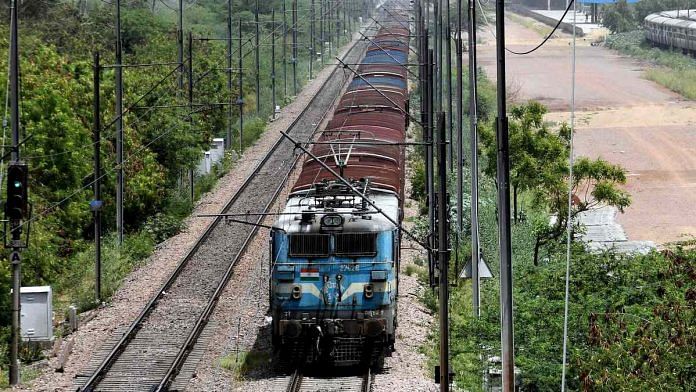New Delhi: Termination payments, granting alternate paths and more relaxations for exclusivity of routes — the Narendra Modi government has planned major concessions to assuage the concerns of private players before they start bidding to operate trains.
These concessions were cleared by the Ministry of Railways and Group of Secretaries (GoS) in a meeting held last week. The meeting was chaired by NITI Aayog CEO Amitabh Kant, Railway Board Chairman Suneet Sharma, Secretary, Department of Economic Affairs Tarun Bajaj, among others.
“In the second pre-bid meeting that was held in January, the bidders had raised certain issues with regard to the draft agreement,” said a senior official in the government.
“The issues were discussed in the meeting with the secretaries, and the draft agreement will be tweaked accordingly,” said the official, who did not wish to be named.
The final bids for 150 private trains, which are scheduled to begin operations on 109 routes by 2023, are expected to come by 31 March.
“It is a rare case where the government is the facilitator and competitor for the bidders, so obviously, the bidders have some concerns,” said a second official, who didn’t want to be identified.
“The government has tried to assuage their concerns in a very meaningful manner, and the new agreement will reflect these relaxations,” he added.
Railway ministry spokesperson D.J. Narain, however, told ThePrint: “Relaxations happen when some rules exist. There is no established rule as yet about running of these trains. So no relaxations have been given to anyone in the context.”
He added: “What has happened is that the prospective bidders had raised certain concerns in the second pre-bid conference for PPP in the Passenger Train Project held on 20 January. The ministry has in consultation with authorities concerned deliberated on these issues. These issues have been suitably addressed, which have been communicated to the prospective bidders as part of replies to second pre-bid queries on 15 February.”
Also read: More private trains, higher spending, green energy focus — what Rail Budget could look like
Termination payment clauses
One of the major changes to the Draft Concession Agreement is the clause for termination payment under some conditions.
The Group of Secretaries was told that the agreement does not provide termination payment or buyback payment for termination of the contract on account of a non-political force majeure or ‘act of God’ after the commencement of operation.
The GoS was of the view that it is important for the biddability of the project that the private players have the option of termination payment even before the commencement of the operations in case of a natural calamity or any other non-political untoward event.
Since this clause is granted in all other PPP contracts, including railway station redevelopment, it must be extended to the Railways as well, the GoS suggested.
A termination payment of 70 per cent of the ‘adjusted depreciated value’ of trains and specified assets has been prescribed by the GoS.
Alternate paths if existing ones are not profitable
The draft agreement said in case the capacity utilisation of Railways is less than 50 per cent for 12 consistent months, the concessionaire will have the right to surrender operation on that path.
However, sources said, private bidders questioned how rakes will be utilised if operations are surrendered on a path.
According to the sources, the Group of Secretaries has recommended that the Ministry of Railways should provide alternate paths to the private operator in this case.
This would mean if a particular route is not viable for the private player, they will be given options to run trains on other routes, and it will be ensured that no other train operates on that route before and after 60 minutes of the private train’s departure time.
More exclusivity, less competition
Further concessions to ensure exclusivity of private trains have also been made.
According to the draft agreement, in case the private train on a particular route has a capacity utilisation of over 80 per cent for 12 months, the Railways will be allowed to run its own similar trains on that route before and after 60 minutes from any station within 20 km of the originating station.
However, since the private players are confident that they will be able to achieve a capacity utilisation of over 80 per cent very easily, they have requested the government to increase this limit to 90 per cent.
What this means is that there will be less scope for competition for private trains from the Indian Railways even if there is rush on their routes.
Sources told ThePrint the private players have also asked the Railways to ensure that no similar train plies one hour before and after from any station within 50 kilometers instead of 20 kilometers of the originating station. However, the government has not taken a decision on this demand yet.
Lastly, the Group of Secretaries has directed the Railways to give more clarity to the private bidders regarding depot locations for private trains.
According to sources, private bidders had raised concerns regarding less clarity in plans, connectivity, availability of infrastructure and utilities. The GoS told the railway ministry that lack of transparency and information on this could affect biddability, and requisite information must be provided before the final bids are made.
Also read: Railways says private players running trains can decide their fares. But there’s a catch



